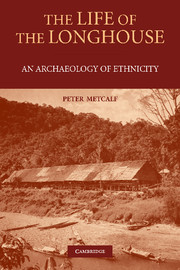Book contents
- Frontmatter
- Contents
- List of Figures
- The Problem: Ethnicity and Community
- PART I LONGHOUSES
- PART II LONGHOUSES AND LEADERS
- PART III LONGHOUSE AND TRADE
- PART IV LONGHOUSE POPULATIONS
- PART V LONGHOUSES AND RITUAL
- PART VI LONGHOUSES AND THE STATE
- Conclusion: The General in the Particular
- Appendix
- Bibliography
- Index of Ethnonyms
- Index of Authors and Subjects
Conclusion: The General in the Particular
Published online by Cambridge University Press: 25 January 2010
- Frontmatter
- Contents
- List of Figures
- The Problem: Ethnicity and Community
- PART I LONGHOUSES
- PART II LONGHOUSES AND LEADERS
- PART III LONGHOUSE AND TRADE
- PART IV LONGHOUSE POPULATIONS
- PART V LONGHOUSES AND RITUAL
- PART VI LONGHOUSES AND THE STATE
- Conclusion: The General in the Particular
- Appendix
- Bibliography
- Index of Ethnonyms
- Index of Authors and Subjects
Summary
From the point of view of historians and sociologists, ethnographers are often seen as making generalisations based on skimpy data – little more than a few personal experiences. During his enfant terrible phase, Edmund Leach made the same charge against the pioneers of modern fieldwork:
When we read Malinowski we get the impression that he is stating something which is of general importance. Yet how can this be? He is simply writing about the Trobriand Islanders. Somehow he has so assimilated himself into the Trobriand situation that he is able to make the Trobriands a microcosm of the whole primitive world. And the same is true of his successors: for Firth, Primitive Man is a Tikopian, for Fortes, he is a citizen of Ghana.
(1961:1)I avoid the charge by denying that I am saying anything generalisable, that is, anything about the essential nature of cultural difference. On the contrary, my goal is to show how ethnicity was constructed in a specific region and under specific historical circumstances.
My method is unabashedly analytic; it makes no concessions to postmodernism. Its premise is that nothing about the process of ethnification can be taken for granted. On the contrary, working out how ethnicity works in different places is part of the business of ethnography, what, for want of a better word, we might call “ethnology.” Locating ethnic groups – “naming the tribes” – is a goal of research, not a preliminary.
- Type
- Chapter
- Information
- The Life of the LonghouseAn Archaeology of Ethnicity, pp. 311 - 322Publisher: Cambridge University PressPrint publication year: 2009



